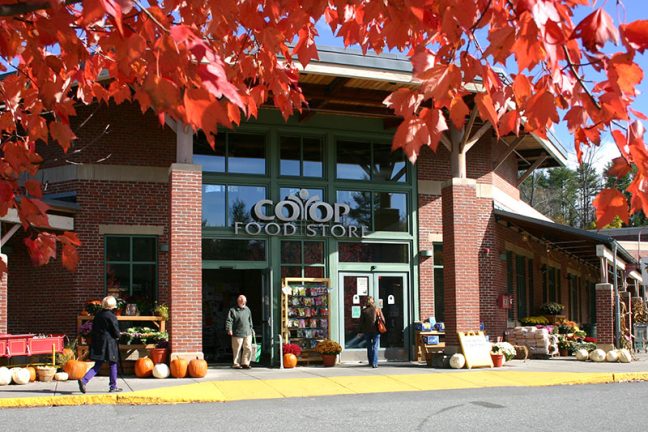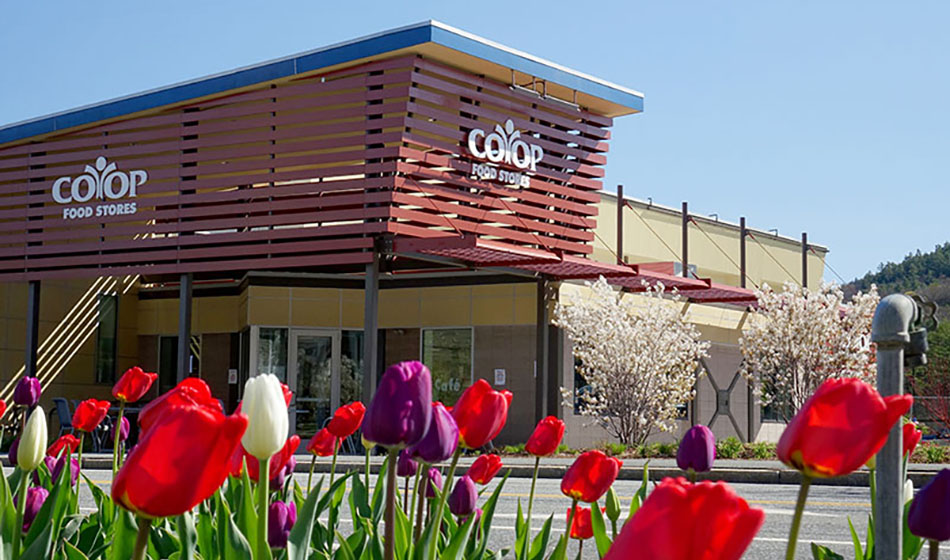Dawn Archambeault, director of marketing and consumer relations for Co-Op Food Stores in New Hampshire, discusses the company’s approach to operating two co-ops in proximity to one another yet in distinctly different neighborhoods of the Upper Valley region.

What are some of the biggest differences between your two co-ops?
While each store has its own charm and feel, the primary difference is the shopper. Our store in Lebanon, near the Dartmouth Hitchcock Medical Center, has hours (7 a.m. to 9 p.m.) that are aligned with shift changes and providing access to as many workers as possible as they come and go from their day.
Our Hanover location sits in the heart of the Dartmouth College campus and primarily sees shoppers from the local community and campus, with store operations from 8 a.m. to 8 p.m.

Are there similarities between the two locations?
At each co-op, we offer both conventional and natural options to our shoppers and member-owners, with a heavy focus on local. And we don’t mean “local” as in regional (though we do love them, too), we truly mean local – these are the farmers in our communities and on our back roads.
We pay our farmers what they are worth and partner with them to plan their growing season because we sincerely believe that supporting our local producers and economy is how we can have the most impact in our corner of the world.
It sounds like prioritizing and managing relationships with local farmers and producers is important to you. Can you expand?
Our relationships with our farmers and local vendors are a pivotal part of our business, and we have become an integral part of our farmers’ stability.
Every year for over 25 years, we have hosted an annual growers meeting, where we talk with the growers to set up secondary and tertiary suppliers to minimize gaps in crops and ensure fair prices for their products.
Our meeting brings all our local farmers and growers together to talk with us about their crop plans and our product needs. They not only work with us, they work with each other to ensure the agricultural needs of our community are met. If you ask us, that is something pretty special.
Speaking of local, what role do your co-ops play in the local community, and how do you measure its impact?
In addition to our focus on local, one of our other primary focuses is food access in our community. Since 2016, our round-up program has raised more than $1.4 million for food access partners in our community.
We are also very proud to support the arts – community events such as the Quechee Hot Air Balloon Festival, Juneteenth, the Upper Valley Pride Month, youth sports, food drives, donations to local schools, fundraisers and everything in between.
Of course, we have monthly numbers of donations and collections, but I sincerely believe that being an involved community partner is impossible to measure or quantify.
How do you balance the needs and preferences of your member-owners, which might include Dartmouth College students, faculty, medical professionals, longtime residents and tourists?
Balance comes in many forms. With our heavy focus on community and food access, we try to offer multiple options within categories to let our shoppers decide what is right for them. [That could be] the choice between conventional bananas and Equal Exchange bananas. We try to give our shoppers the options to make the choices that are best for them.
We also have an active – and highly utilized – survey program to gather feedback on what our shoppers need and are looking for from us. Our customers are also very engaged with our website, which offers the ability to submit questions, comments and product suggestions, giving us the opportunity to really listen to our customers and calibrate accordingly.
The Upper Valley’s labor market can be competitive. How do you attract and retain qualified staff?
The labor market is very tough in our area for many reasons, including [lack of] affordable housing.
This is why, throughout the year, we continually evaluate and focus on offering competitive wages, exceptional health benefits, flexible schedules, a strong employee discount and continuing to provide a culture that fosters a sense of community and belonging.
How do you compete with larger grocery chains and online retailers in the region?
We try our hardest, but it’s nearly impossible for us to compete with big chain stores on price. In most cases, they are selling conventional products for less than we can even purchase them for because of their buying power. So, we must focus on our strengths and what makes us different.
Differentiators like our partnerships with our local growers and suppliers, active involvement in the community, our “house made” prepared foods (that are also primarily made with our local products), our homebound delivery program for shoppers who are unable to physically shop at our stores (though we do also offer Instacart).
So, while we can’t usually compete and win on price, in a sense, they must compete with us on everything else that matters.
[RELATED: Opportunity For Independent Grocers Abounds In Urban, Diverse Northeast]

